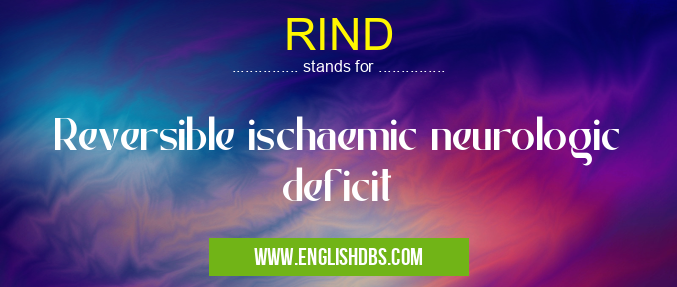What does RIND mean in THERAPEUTICS
RIND stands for Reversible Ischemic Neurologic Deficit. It is a neurological condition that occurs when there is a temporary interruption of blood flow to the brain, causing a loss of function in a specific area of the brain. RINDs are typically transient and resolve within 24 hours, but can sometimes last for up to a week.

RIND meaning in Therapeutics in Medical
RIND mostly used in an acronym Therapeutics in Category Medical that means Reversible ischaemic neurologic deficit
Shorthand: RIND,
Full Form: Reversible ischaemic neurologic deficit
For more information of "Reversible ischaemic neurologic deficit", see the section below.
» Medical » Therapeutics
Causes
RINDs are usually caused by a blockage in a small blood vessel in the brain, such as an embolism (a blood clot that travels from another part of the body), a thrombosis (a blood clot that forms in the artery), or a vasospasm (a sudden narrowing of the artery). Other risk factors for RINDs include high blood pressure, diabetes, smoking, and heart disease.
Symptoms
The symptoms of a RIND depend on the location of the blockage in the brain. Common symptoms include:
- Weakness or numbness on one side of the body
- Difficulty speaking or understanding speech
- Vision problems
- Dizziness or balance problems
- Headache
Diagnosis
RINDs are diagnosed based on a patient's symptoms and a physical examination. A doctor may also order tests such as a CT scan or MRI to rule out other conditions, such as a stroke.
Treatment
There is no specific treatment for RINDs. However, treatment may be necessary to address the underlying cause of the blockage, such as medications to lower blood pressure or cholesterol, or surgery to remove a blockage.
Essential Questions and Answers on Reversible ischaemic neurologic deficit in "MEDICAL»THERAPEUTICS"
What is a Reversible Ischaemic Neurologic Deficit (RIND)?
A RIND is a temporary interruption of blood flow to the brain, causing symptoms that resolve within 24 hours. It's a warning sign of a more serious stroke.
What are the symptoms of a RIND?
Symptoms may include weakness or numbness on one side of the body, difficulty speaking or understanding speech, and vision problems. They usually resolve within a few hours.
What causes a RIND?
RINDs are usually caused by a blood clot that briefly blocks an artery in the brain. Other risk factors include high blood pressure, high cholesterol, and smoking.
How is a RIND diagnosed?
A doctor will perform a physical exam and ask about your symptoms. They may also order imaging tests, such as a CT scan or MRI, to rule out other conditions.
What is the treatment for a RIND?
There is no specific treatment for a RIND, as it resolves on its own. However, your doctor may prescribe medications to prevent future strokes, such as antiplatelet drugs or anticoagulants.
What is the prognosis for a RIND?
Most people with RINDs recover fully. However, it's important to take steps to prevent a more serious stroke, such as controlling blood pressure, quitting smoking, and eating a healthy diet.
Final Words: RINDs are a common neurological condition that is typically transient and resolves within 24 hours. However, they can sometimes be a sign of a more serious underlying condition, such as a stroke. If you experience symptoms of a RIND, it is important to seek medical attention promptly.
RIND also stands for: |
|
| All stands for RIND |
